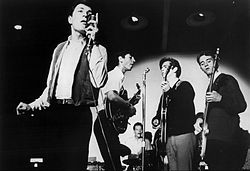The Detroit Wheels
| The Detroit Wheels | |
|---|---|

Mitch Ryder and the Detroit Wheels in 1966.
|
|
| Background information | |
| Also known as |
|
| Origin | Detroit, Michigan, U.S. |
| Genres | |
| Years active | 1964–1967 |
| Labels | |
| Associated acts | Detroit |
| Past members | See members section. |
The Detroit Wheels were an American rock band, formed in Detroit in 1964. They served as Mitch Ryder's backup band from 1964 to 1967.
The band had a number of top twenty hits in the mid-1960s before lead singer Ryder was enticed away by Bob Crewe with offers of a solo career, after which the group quickly dissolved. Two of its former members, McCarty and Badanjek, later reunited to establish the nucleus of a new band called The Rockets, after Jim McCarty found some fame with the hard rock outfit Cactus.
The band had its origins in Detroit in the early 1960s. At this time, a young white singer by the name of William Levise, Jr., who was singing at a black soul club called The Village, met a rock & roll group which included McCarty, bassist Earl Elliot, and Badanjek. Levise decided to join the group and took the stage name of Billy Lee, and the band became Billy Lee and the Rivieras. After attracting attention from producer Bob Crewe while working as a support act to The Dave Clark Five, the group moved to New York to start recording. However, since another band had already recorded as The Rivieras, the band decided to change its name again. With the help of a phone book, Levise took the new stage name of Mitch Ryder, and Mitch Ryder & The Detroit Wheels were born. The group's live performances are said to have had an "explosive quality" and their style has been described as "revved up...R&B".
Mitch Ryder & The Detroit Wheels had their first big hit in 1965 with "Jenny Take a Ride", which reached #10 on national charts, and #1 on the R&B chart – the first time a self-contained rock group had achieved the latter distinction. It sold over one million copies, and was awarded a gold disc by the RIAA. Crewe had originally planned to release the track as a B side, but changed his mind after seeing the reactions of Brian Jones and Keith Richards, of The Rolling Stones, who were in the Stei-Philips studio in New York City as it was being recorded.
...
Wikipedia
